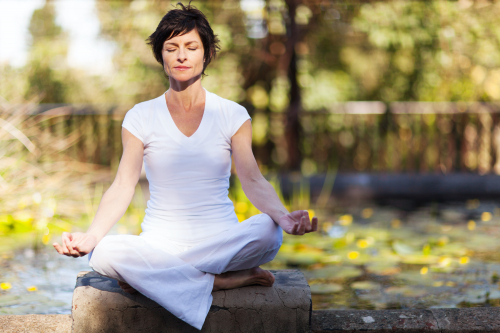Different Kinds of Meditation

We live in a world of choice; 50 shades of grey, 150 flavors of ice cream, 50 styles of yoga, and over 300 various mind/body practices of meditation. It’s oh so easy to get frozen in the decision-making process and then not choose anything! Below is a summary of the different kinds of meditation to help you find the technique that resonates with you, so you can exercise your mind to be more potent and free.
First, let’s back up and discuss the benefits of meditation, and specifically, the practice of mindfulness, which is one of the most researched topics in psychology and neuroscience these days. Unequivocally, as exercises, it shows positive results in both brain and mental/emotional health. Though we tend to think of meditation as only something to bring mental benefits like increased attention span, heightened concentration, improved focus capabilities, peace, and tranquility, all the various techniques also have a somatic, or body-centric, benefit by invoking the parasympathetic nervous system. The result is lowered stress hormone levels, relaxed muscles, oxygenated blood cells, and ultimately, a deeper mind-body connection.
Current researchers have been cataloging the various practices, and have synthesized them down to the 20 most common, which can then be subdivided into 3 primary themes; Focused Attention, Open Monitoring, and Ethical Enhancement. Though there are the various flavors imbued from the original religious or spiritual wellspring that these techniques are associated with—whether Christian, Sufi, Buddhist, Judaic, Taoist, or Hindu—they are all, at their core, techniques to train our mind to be in present moment awareness, a mental state called consciousness.
Focused Attention Meditation
Focused Attention Meditation (FA) uses a vast array of internal or external phenomena to concentrate the mind on. From the sensations of the breath rising and falling or passing the tip of the nostrils; to gazing at a candle flame; the sounds of singing bowls, word phrases, mantras or, chants; or the details of each foot landing in slow motion while mindfully walking, focusing is the focus. When we notice our attention drift to thoughts, feelings or, body sensations, all schools of this form of meditation encourage a non-judgemental “letting go” followed by a return to concentrating the awareness on the stimuli. Brain scans show increased neuron activity in the centers responsible for cognitive control, thought regulation, and sensory information processing. Try this 8-minute breathing meditation:
Open Monitoring Practices
Open Monitoring Practices (OM) do not use an object of focus. Instead, they center on moment-to-moment awareness of thoughts, feelings, and body sensations also without judgment or preference. Again, with this practice, certain areas of the brain show improvements in action and thought regulation, cognitive control, and sensory information processing. These schools of meditation practice noticing and letting go of anything and everything to foster awareness of our thought tendencies, from a place of present moment witnessing without attachment.
Ethical Enhancement
Ethical Enhancement forms of meditation (EE) include contemplative, gratitude, and compassion centric exercises. They tend to focus thoughts and feelings towards higher states of acceptance and loving-kindness. The improvements noticed through neuroscience are related to areas in the brain associated with ’empathy’, ‘pain perception’ and, ‘body sensation processing’.
Whether you choose to start a meditation practice from any one of these channels, the results are beneficial for the mind, heart, and body. Besides becoming practiced in being focused, aware, or more compassionate for self and others, you’ll notice how your interpersonal presence increases, your ability to stay on task at work increases, and how anxious thoughts can be simply noticed and let go. All of these benefits bring more peace, and joy to our lives.
How To Start A Meditation Practice
Here is a simple starting formula:
- Pick a time of day that you can own as consistently yours; before getting into bed, or after your morning shower and smoothie.
- Create a place that invites you to feel calm and relaxed; a chair or cushion in corner of a quiet room, perhaps a serene piece of art or houseplant nearby.
- Start gently, set a pleasant bell or gong timer for just 5 minutes.
- Lightly close your eyes, breathe slowly and deeply from the bottom of your belly to the top of your ribs through your nostrils.
- Invoke your mind’s focus on either the movement/sensation of your breath; the light awareness of the thoughts, feelings, sensations that arise; or focused thoughts or images of gratitude or compassion.
- Be kind to yourself if you notice a constant stream of thoughts interrupting your practice, this is a normal occurrence for all of us—be patient and, over time your concentration will increase and so too will the space between thoughts.
- Keep a journal to track your experience and insights.
We hope this helps you on your journey to balanced health. If you would like a kickstart, including guided meditations, please join us for an upcoming Basecamp Weekend Retreat, an online retreat where our expert team brings our award-winning program to you.
What is Mountain Trek?
Mountain Trek is the health reset you’ve been looking for. Our award-winning hiking-based health program, immersed in the lush nature of British Columbia, will help you unplug, recharge, and roll back years of stress, anxiety, and unhealthy habits. To learn more about the retreat, and how we can help you reset your health, please email us at info@mountaintrek.com or reach out below:










